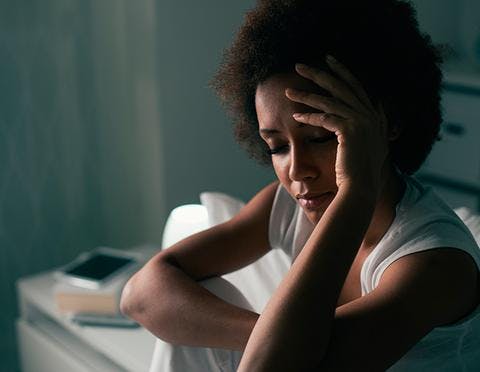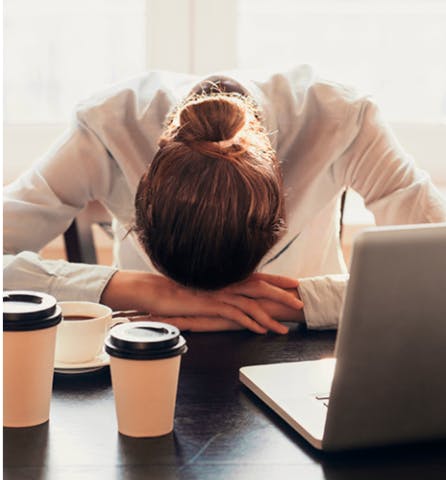Understanding Insomnia

“He would lie in the bed and finally, with daylight, he would go to sleep. After all, he said to himself, it is probably only insomnia. Many must have it.”
― Ernest Hemingway
There’s a saying that ‘nothing cures insomnia than the realisation it’s time to get up!’ This rings true for many - however, the alarm clock is definitely not the most effective long term solution for insomnia! There’s really not much to laugh about when you’re laying there at 2am in the morning with thoughts (neither logical or rational ones) flying through your head. While it may seem to you, while you’re tossing and turning, that the rest of the world is soundly sleeping, you’re definitely not alone. It may come as a surprise to hear that around 1 in 3 people have at least mild insomnia at any given time.
5 Insomnia Facts by the Australian Sleep Health Foundation
- Most people have experienced some insomnia symptoms at some time in their life.
- Older people with poor health are at a higher risk.
- Shift workers are also at a higher risk.
- In the long run, taking sleeping pills may not be effective.
- Sometimes there is no clear cause for insomnia.
So what is the definition of insomnia and how do you know if you’re a sufferer?
According to the dictionary insomnia is an inability to obtain sufficient sleep, especially when chronic. This could be an inability to fall asleep or stay asleep at night, resulting in unrefreshing or non-restorative sleep. In really bad cases it can feel like you’re never really asleep and you’re never really awake. This lack of sleep can adversely affect all aspects of your health and well-being: the tiredness, drowsiness, and lack of energy then impact your mood and concentration and ultimately your productivity. A reliance on sleeping pills, or alcohol can also make your sleep problems worse in the long run. According to helpguide.org more serious health problems such as high blood pressure, obesity, diabetes, stroke, heart disease, Alzheimers disease and certain cancers are also related to chronic insomnia.
Do you have insomnia? We’ve all experienced nights of poor sleep….tossing and turning, getting up over and over to go to the toilet, or get a drink of water, or something to eat. Perhaps counting sheep is your ‘go to’ on such nights.

Not being able to sleep in turn makes you anxious about the resulting tiredness that will ensue the next day...which unjustly makes you less able to sleep! Arghhhh. This can happen if you have jet lag, you’re stressed about something or if you’ve consumed coffee, alcohol or nicotine before bedtime.
- So, how do you tell the difference between a few restless nights and a more serious form of insomnia that may require specialist help? According to the Australasian Sleep Association, you may have insomnia if: Going to sleep takes more than 30 minutes.
- You wake up and stay awake for more than 30-45 minutes.
- You wake up earlier than you'd like and can’t get back to sleep.
- You experience a combination of the above.

What causes insomnia?
As stated by Sleep Disorders Australia there isn’t a single cause of insomnia. Causes may be varied (e.g. medical conditions, medication or worrying events) and can often be defined by “predisposing factors, precipitating factors (“triggers”) and perpetuating factors (maintaining)”.
Some causes include:
- Pain, Respiratory problems like asthma
- Another sleep disorder
- Medication
- Caffeine, nicotine and alcohol
- Going through a divorce
- The death or illness of a family member
- Pressures at work
- And sometimes there is no clear cause at all - this is called primary insomnia.
Recognising the type of insomnia you are struggling with is an important first step towards dealing with the issue. Depending on the doctor or expert, there are many ways to describe insomnia including:
Acute Insomnia
This is usually a one-off or brief episode of having trouble sleeping. Sometimes it’s caused by a stressful time in your life such as losing your job or receiving bad news. It can also be caused by medication, drugs or eating too much food just before bedtime. Acute insomnia is usually resolved without any medical or specialist treatment.
Chronic insomnia
Insomnia is usually considered chronic if you have trouble falling asleep or staying asleep at least three nights a week for three months or longer. There are many causes for chronic insomnia, which could include arthritis, asthma, and neurological conditions such as Parkinson’s disease, chronic pain and nasal allergies.
Comorbid insomnia
This is when insomnia occurs with another condition. This could be a psychiatric symptom such as anxiety or depression, or a medical condition including arthritis and back pain.
Onset insomnia
This is when you have trouble falling asleep when you go to bed.
Maintenance insomnia
This is when you have wake up during the night and have difficulty falling asleep again.
Early termination
This is when you wake up earlier than you’d like to and can’t fall asleep again.
Tips that may help you beat insomnia
Keeping a sleep diary may help you start to identify the causes of your insomnia and any insomnia inducing habits you may have. Try to tackle day time stress & worries and as bedtime approaches, try not to focus on the expectations of the amount of sleep you should be getting. The more anxious you are about not sleeping, the more you worry about going to bed and the more likely you are to continue to create a vicious cycle of sleeplessness.

The National Sleep Foundation recommends:
- Allowing at least 30-minutes of relaxing time before you go to sleep.
- Read a book, do some yoga or try some simple breathing exercises.
- Try to avoid electronic devices such as mobile phones, laptops and tablets before you go to bed and while you’re in bed. Keeping them out of the bedroom is one way of doing this!
- If you don’t fall asleep after 20 minutes, get out of bed and try a relaxing activity, (as stated above), or listen to gentle music. When you start to feel sleepy, go back to bed.
- Try to get up at the same time every morning regardless of how much sleep you’ve had.
- Avoid caffeine, nicotine and alcohol close to bedtime.
- Ensure you have a good sleeping environment. Hang curtains or blinds that block out light and try to keep your room at comfortable temperature.If you live on a noisy street, think about earplugs or an app that produces ‘white noise’.
Professional help for insomnia
If you try the tips above and you’re still having difficulty going to sleep or staying asleep we recommend you seek professional help. Contact your doctor or a sleep disorder clinic to discuss your problems as soon as you can. If you’d like to discuss your mattress, to make sure your current mattress is right for you, contact your local Snooze store.